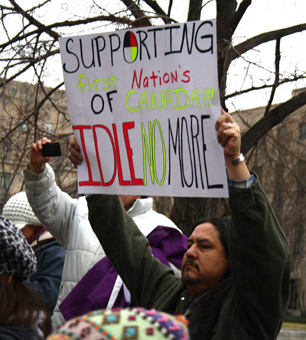Idle No More has organized the largest mass mobilizations of indigenous people in recent history. What sparked it off and what’s coming next?
It took weeks of protests, flash mobs, letters, rallies, and thousands of righteous tweets, but Canadian Prime Minister Stephen Harper finally caved. He agreed to a meeting with the woman who had been petitioning him for twenty-four days, subsisting on fish broth, camped in a tepee in the frozen midwinter, the hunger striker and Chief of the Attawapiskat Theresa Spence.
No, this is not normal parliamentary process. The hunger strike was a final, desperate attempt to get the attention of a government whose relationship with indigenous people has been ambivalent at best and genocidal at worst, and force it to address their rising concerns. The meeting, set for this Friday, January 11, is unlikely to result in any major changes to Canada’s aboriginal policy. Yet the mobilization around Chief Spence’s hunger strike has already grown to encompass broader ideas of colonialism and our collective relationship to the land. The movement has coalesced under one name, one resolution: Idle No More.
Closed-Door Negotiations Spark a Movement
The Idle No More movement arose as a response to what organizers call the most recent assault on indigenous rights in Canada: Bill C-45, which passed on December 14. Bill C-45 makes changes to the Indian Act, removes environmental protections, and further erodes the treaties with native peoples through which Canada was created.
On December 4, when representatives of First Nations came to the House of Commons to share their concerns about the proposed bill, they were blocked from entering . A week later, after being repeatedly denied a meeting with Harper, Chief Spence began her hunger strike. Since then, the movement has grown to encompass a hundred years’ worth of grievances against the Canadian government, which is required by Section 35 of the Constitution Act to consult with native people before enacting laws that affect them. Indigenous leaders accuse the Harper administration of “ramming through” legislation without debate or consultation.
Even worse is the bill’s “weakening of environmental assessment and the removal of lakes and rivers from protection,” says Eriel Deranger, Communication Coordinator of Athabasca Chipewyan First Nation, which is directly downstream from toxic tar sands mining. She knows firsthand the importance of protecting waterways from industrial pollutants. “Indigenous people’s rights,” she says, “are intrinsically linked to the environment.” She adds that the removal of such protections paves the way for resource extraction, bringing Canada closer to its self-stated goal of becoming a global energy superpower. This isn’t just a native thing, Deranger says; this is something that affects everyone.
And so begins the largest indigenous mass mobilization in recent history. Native people and their allies from all over North America have gathered to peacefully voice their support for indigenous rights: they’ve organized rallies, teach-ins, and highway and train blockades, as well as “flash mob” round dances at shopping malls.
With Twitter and Facebook as the major organizing tools, #idlenomore has emerged as the dominant meme in the indigenous rights movement. In addition to events across Canada, a U.S. media blitz tour has inspired solidarity actions all over North America, as well as in Europe, New Zealand, and the Middle East. Mainstream media and the Harper government are taking notice.
Anger at Environmental Destruction in Canada Boils Over
But why now? The answer, says Deranger, is that people are ready. Idle No More arose at a moment of growing awareness of environmental justice issues, frustration with lack of governmental consultation, and widespread opposition to resource extraction on indigenous land—like the tar sands in Deranger’s home province of Alberta and the diamond mines in Chief Spence’s Ontario. It comes after years of grassroots organizing around indigenous rights—which are, in the end, basic human rights.
Visit almost any reserve in Canada, and you’re likely to see third world social indicators in a first world country: high incarceration rates, inadequate housing and sanitation, reduced life expectancy—due in part to abnormally frequent suicides—lack of employment and education opportunities, and substance abuse. This, after more than a century of colonization by a government that refuses to acknowledge its identity as a colonial power. Meanwhile, native youth are the fastest-growing segment of Canada’s population, according to Aboriginal Affairs. Is it any surprise that they’re taking on repressive legislation and using social media to organize?
For Canadians—and potentially all North Americans—this is a moment of reckoning. Just as Chief Spence’s hunger strike forced the issue with Harper, Idle No More forces us all to confront the ugliness of our collective colonial history, and to recognize that colonization continues today.
It holds up a mirror to our society, questioning the historical narrative we’re all taught to believe. It asks: On what values was our country founded? And, because identity is created out of that narrative: Who are we, really? And who do we want to be?
Trump is silencing political dissent. We appeal for your support.
Progressive nonprofits are the latest target caught in Trump’s crosshairs. With the aim of eliminating political opposition, Trump and his sycophants are working to curb government funding, constrain private foundations, and even cut tax-exempt status from organizations he dislikes.
We’re concerned, because Truthout is not immune to such bad-faith attacks.
We can only resist Trump’s attacks by cultivating a strong base of support. The right-wing mediasphere is funded comfortably by billionaire owners and venture capitalist philanthropists. At Truthout, we have you.
We’re in the midst of a fundraiser, and as of right now, we have until midnight to raise $12,000. Please take a meaningful action in the fight against authoritarianism: make a one-time or monthly donation to Truthout. If you have the means, please dig deep.
